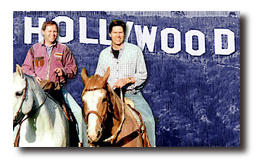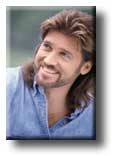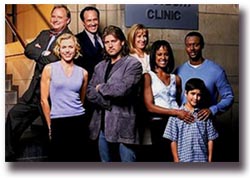TV & Streaming Reviews
Be a REVIEWER
Show TV series titles index…Special Feature
An Interview with the Producers of “Doc” and “Sue Thomas: FB-Eye”

“I was at the top of my career, making more money in a year than I thought I'd ever make in a lifetime. I had the respect of my peers and was included in one of the most elite clubs in the world—Hollywood. But still I wasn't at peace. I came home one night and said to my wife, 'I'm sick of Hollywood, of the lying, the cheating, the backstabbing. Let's leave the business, go somewhere and become missionaries.' She looked at me for a moment and said, 'Name one place on Earth that needs missionaries more than where you are right now.”
So said film and television producer, David Johnson in a letter to his pastor in 1995, before he and his brother Gary Johnson made the decision to leave their work at companies like Dreamworks and NBC, to go to work for PAX, making shows like “Doc” and "Sue Thomas: FB-EYE." Shows that have won the Parents Television Council's highest awards, and have people like James Dobson and Steven Curtis Chapman singing their praises.
We trust you will enjoy this exclusive interview that Christian Spotlight brings to you from the Producers of "Doc." If you are not familiar with the show, please visit our “Doc” ratings & review page.
Considering all the "big-name" companies you've worked with, what made you want you to get on board with a rather, new, untested company like PAX?
Well, at PAX we knew their whole reason for being was to do good family values-type entertainment - you know, things the whole family could watch. And those are the kind of shows we have always liked making and have made. But it's getting harder and harder all the time it seems to get those shows on the major networks. People in this business would tell you 'families don't watch T.V. together.' But we didn't believe that was totally true. And we felt that the reason families didn't watch T.V. together was that the major networks didn't make shows the whole family wanted to watch. Then when PAX came along, it was like an answer to prayer for us. And I think a lot of other people feel that way too, by the way. It was just a perfect natural fit for us: The greatest thing about working for PAX is we never get that call from the network saying 'this has to be edgier or this has to be sexier,' and with the other networks, we got those calls all the time. So now we're doing exactly the kinds of shows we want to do, exactly the way we want to do it. In this business that's rare and great.
How involved in casting decisions do you get? Did you always know Doc was a project for Billy Ray Cyrus, or were there other contenders for the part?
[Laughs] Uh, well we we're having our own casting sessions, and, no, it wasn't a Billy Ray project. We were just  casting and one day the casting director walked in and said "would you have any interest in Billy Ray Cyrus?" And we were like, "no, not really." Mainly because what we had in our minds was not the short hair with the long pony-tail kind of deal. Basically, the image we knew from "Achy-Breaky" was not how we envisioned this character. Plus, we didn't know if he could act or anything else. So the casting director said okay, but then about three or four days later she called again and said "Billy Ray Cyrus would like to fly out here and read for the part. Will you see him if he comes out here?"
casting and one day the casting director walked in and said "would you have any interest in Billy Ray Cyrus?" And we were like, "no, not really." Mainly because what we had in our minds was not the short hair with the long pony-tail kind of deal. Basically, the image we knew from "Achy-Breaky" was not how we envisioned this character. Plus, we didn't know if he could act or anything else. So the casting director said okay, but then about three or four days later she called again and said "Billy Ray Cyrus would like to fly out here and read for the part. Will you see him if he comes out here?"
And we said, "Well, yeah sure we'll see him, who are we not to see somebody? But we want you to make it clear to him, that while we're happy to let him audition, it's not like we requested him." And so she called back and said, "He's coming."
Of course Billy had this whole other side where he almost didn't come. Ten minutes before the car came to pick him up, he called his manager and said, "I don't know what I'm doing, these guys don't want me, I'm not gonna get this, I'm not going." But what finally made him decide to come, is that he just decided that if this wasn't gonna happen, it wouldn't be because he wouldn't get on the plane. His thing was that if God wanted him to have this part, then He'd make it happen. If He didn't, then He wouldn't. But Billy's job had to be to just get on the plane. And so he showed up. And we didn't know he was a believer at the time, until he came in and in literally about 10 minutes he started giving us his testimony and we started giving him ours, and we knew it was meant to be.
Even though Doc has an urban setting, do you feel it appeals to “heartland” viewers more than other major shows?
Well yeah, I mean that's our goal, we're heartland guys. We grew up in Iowa. It was always our goal to create an Andy Griffith for the new millennium. As if Andy Griffith were a doctor and moved to New York, what would that show be? And we think it would be something like Doc.
As a big fans, we have to ask, was there any spike in viewership when Steven Curtis Chapman guest-starred?
There definitely was, and also when CeCe Wynan was on. We want to do a lot more of that. Michael W. Smith has mentioned that he wants to do a show and number of other Christian artists want to be on the show. So we look forward to having them.
Dave, you mentioned in a letter to an unnamed pastor that "you felt called to be a missionary in a place that was truly embroiled in spiritual warfare," meaning Hollywood. Do you ever feel like a David taking on a Goliath?
Yes, sometimes. Actually what happened was that I didn't come out here to do this. It wasn't like God called me to move to Hollywood and be a missionary. It was more like, once I was here and in the middle of my career, I really began to understand what it was to have a true, deep relationship with God and with Christ. And even though I was already successful, I was sort of tired of all the lying and cheating, and all the other things that go on. And I had been doing some very high-profile, big-time stuff. So one day I said to my wife, "Let's just forget all this and go be missionaries someplace." Not really meaning that, more meaning let's go someplace where no one speaks English so I don't have to talk to anybody [laughs]. And she looked at me and said, "name me one place on Earth that needs missionaries more than where Hollywood." And that changed my life.
It definitely is David versus Goliath, especially in the sense that—and this is the thing we always have to keep reminding ourselves—there's no way we can win this battle alone. It's just way bigger than we are. But you know what, we're not called to go in and win God's battles for him. David didn't win that battle because he was great on his own, he won it because he allowed God to work through him.
It seems like one of the most effective elements of Doc is that, while it portrays someone living a Godly life, it doesn't superimpose heavy-handed evangelism. Yet it seems to be drawing a response from mainstream audiences more than that traditional type of “Christian” programming. Any feelings as to why this is?

Well, I think you hit it on the head; Doc doesn't preach. I mean, y'know it's a mistake in our view that, oftentimes, when we try to go out and witness to people, we sort of lead with our closing argument. And first, the Bible says, you have to earn the right to be heard.
It's the same with entertainment. First we have to entertain, to make people laugh, and make people think, and make people get emotionally attached to our characters and our story. Once they do that, they feel like they're part of our family, and at that point we can present things to them. And it's how we present it to them that's important.
I've said this many times, but if you ask anybody right now, again using "The Andy Griffith Show" as an example, were Andy Taylor and Opie Taylor—were those people believers? Well, I mean clearly if you watch the show you go "yes." And, how do you know? It wasn't because they walked around and only talked about Jesus all day, but we saw them coming from church, talking with the pastor. And we know because the lessons that were in the show were our Christian beliefs. It may sound silly, but sometimes you can learn more about character and growth from an Andy and Opie scene than you can from some preachers in a pulpit. So that to me is what it's about. Yes we want the choir to like what we do, but ultimately what we do is not for the choir, it's for the people outside the church, it's to bring them in. And we will bring them in, if we do it in such a way that it's attractive to them. And a lot of them will stay.
This was mentioned earlier, but on a personal level, the Bible says all Christians are aliens and strangers in this world. Do you feel even more “alien” in Hollywood, or is it not as decadent as people might think?
Gary: I think it's probably every bit as decadent as people think.
Dave: I suspect it's much more decadent, in fact, I'm quite positive it's much, much, much, much more decadent than anybody thinks. And that's part of the problem, because they can't believe that there are people that are that self-absorbed, dishonest, and unloyal. As a general rule, the people who live in fly-over country (which is what people in New York and L.A. call the rest of the country), people who live in real America are generally a good lot of people. Whether they're believers or not, they kind of have a sense of morality and honesty and values. Now, I would say unfortunately that's changing for the worst, and the media is a big reason for that. But there are so many people inside of Hollywood (there are also decent people inside Hollywood, don't get me wrong), but there is a huge number of people in Hollywood who do things on a routine basis in terms of ethics, in terms of human behavior, and in terms of honesty, that no one on the outside would ever even consider because it's just not acceptable.
Lying is so endemic to the Hollywood culture, nobody ever questions whether they're being lied to, we just assume we are. I mean the old joke in Hollywood is that some people will lie even when telling the truth would be better for them, simply because they don't know how to tell the truth. And that level of dishonesty was one of the things that struck me most when I first came here.
Because your shows avoid violence, sex, and other offensive material, some conventional writers and producers might accuse them of being unrealistic. How would you respond to that?
First of all, we're not doing a documentary. But, personally, we think both “Doc” and "Sue Thomas" mirror most people's lives better than any other shows on television. I mean, think about it, most people are about being honest, doing good, trying to get through the day the best they can. Being good friends, being good family. Having character. And for those people who say such things don't reflect their lives, well that's probably true. Probably because they're the media elite in New York and L.A. And I think those are the people who are sort of the gatekeepers of the mainstream shows, which is why I think a lot of primetime T.V. is so out of touch with the rest of the country.
Did it surprise you to receive such an outpouring of support from your Christian peers?
Surprising, no. But I'll tell you our frustration because we've been in this business a long time. Our frustration is—and there are things being done about this so it's not a negative in any way—We're not surprised by their support so much as we're always dismayed by how long it takes to get there. And in fact we still don't have it. If I [Dave] went right now in front of most churches, (and I have done this in a few), and said, "we do this show called 'Doc,' how many of you have seen it or heard of it?" Well, you know maybe 30 or 20 percent would have heard of it, and maybe 15 percent would have seen it. Yet of those people who had heard of it and had seen it, if I said "how many of you love it," not like it, but love it, that would probably be 80 or 90 percent.
So the point is Christians aren't really looking for this type of material, and unfortunately today is a time where you kind of have to seek it out. And things like what you guys are doing helps—we didn't use to have that in the past. And we've done a lot of Christian radio, which has grown, and that helps. And Christian publications have come on board. You know, I did Dr. Dobson's show and Janet Parshall's show and they're big fans, so that helps. But there's still such a huge part of the Christian body, and we're talking about people who would say "yeah, the most important thing in our lives is our faith," who have maybe never watched our shows, who don't know anything about them. Or maybe they've heard of them, but just never gotten around to watching them.
And, you know, we understand that from some standpoint because they have busy lives and it's not their job to support our shows. However, if you are going to complain about what's out there, you have to support those things that reflect your values. And if you don't, it's very likely they're gonna go away. Because, let me [Dave] put it this way, those people who are watching "Joe Millionaire" and "Blind Date" and all these shows that end up with two girls and a guy together, those people are not watching “Doc” and they're not embracing "Doc." We need the people who think that other stuff is disgusting to embrace us. And here's the thing about it: If that happened, if that happened next Sunday night, we would beat ABC, CBS, and NBC in a national rating and it would probably be one of the most history making events ever in Hollywood. And it is difficult because we don't get publicity from what we call the "gate-keeper" shows like "Entertainment Tonight" and "Extra."
So how are you getting around those obstacles?
A lot of the secular press is finally picking up on "Sue Thomas," so we are getting play out of that. And, of course, we try to publicize to the Christian body any way we can. And if we can get our people on various talk shows, that's always good. But then, like we said, the big talk shows like Oprah, Letterman, Leno, will not embrace us. We can't get anybody on any of those shows. I mean, they'll say to us, "Well, you're not 'Survivor,'" or you're not this; however, they will take something like "The Anna Nicole Show" and "The Shield," which is on FX. Yet “Doc” and "Sue Thomas" get ratings much, much higher than those shows, but they're the ones getting all the publicity. And you know what, that's okay, we're just continuing to get the job done one person at a time, one step at a time.
we try to publicize to the Christian body any way we can. And if we can get our people on various talk shows, that's always good. But then, like we said, the big talk shows like Oprah, Letterman, Leno, will not embrace us. We can't get anybody on any of those shows. I mean, they'll say to us, "Well, you're not 'Survivor,'" or you're not this; however, they will take something like "The Anna Nicole Show" and "The Shield," which is on FX. Yet “Doc” and "Sue Thomas" get ratings much, much higher than those shows, but they're the ones getting all the publicity. And you know what, that's okay, we're just continuing to get the job done one person at a time, one step at a time.
Regarding "Sue Thomas: FB-Eye," a show about a deaf FBI Investigator, I noticed in a press release, David, you said: "We believe this is a precedent-setting series.Never before has there been a television show about the real life experiences of a deaf person." I couldn't help draw a parallel to "Will and Grace," which was also lauded as precedent-setting show because it was the first show to feature a gay lead. While that program was fairly lavished with praised, "Sue Thomas" was not equally celebrated for its progress. Any feelings on that?
Dave: I find it extremely, extremely baffling. To some of those gate-keepers I was talking about, I want to ask, "Explain to me why the first show in the history of television where a deaf or disabled person has been in the title role isn't  major news?" I am baffled by the lack of interest in that topic, I really am. And again, it doesn't surprise me at all with "Will and Grace," that they would go overboard to say "ground-breaking television." And you know what, if that's the first one, they can say its ground-breaking television. But "Sue Thomas" is also the first one and I think it should be recognized as ground-breaking too.
major news?" I am baffled by the lack of interest in that topic, I really am. And again, it doesn't surprise me at all with "Will and Grace," that they would go overboard to say "ground-breaking television." And you know what, if that's the first one, they can say its ground-breaking television. But "Sue Thomas" is also the first one and I think it should be recognized as ground-breaking too.
However, we have received thousands of letters from the deaf and disabled community saying this show has changed their lives. And that's what we're interested in. I'll be quite honest with you, I've told the staff here, and I've told people all along the way, these shows will be successful, but they're not gonna get there the same way every other Hollywood show did. Because when they do get there, we can look back and say only God could have done this. It didn't happen because NBC embraced it, it happened because God did.
New York Newsday said of the show "Sue Thomas: FB-Eye": "determinedly anti-hip, it creates its own kind of cool." Would you say that accurately describes your work and mission?
Dave: [Laughing] That's our favorite line from any review ever—the one we're most proud of. Jeff Foxworthy once said there are 200 million people between New York and L.A. who ain't hip and don't want to be, [still laughing] that's our audience too.
Gary: Though we are doing pretty well in L.A. and New York now too.
Dave: And the people who say that stuff are not average Americans. Most people see through this “hype” and “hip” stuff. Again, I go back to these gatekeeper shows, the talk shows, the magazines, the entertainment shows: It's what they talk about all day that makes these things seem more popular than they are. I mean, we have more than two million viewers every Sunday night for “Doc” and "Sue Thomas," each, yet we get no publicity from these shows.
And do you think that's part of that spiritual warfare you were talking about earlier? For lack of a better phrase, that you've kind of got Satan trying to keep these types of shows down?
Dave: Well, yeah, I think that's part of it—absolutely I do. I mean, I don't think it's necessarily something people know they're doing, but I do believe some people are unwittingly being used in that way. However, I will tell you, it goes beyond shows on a network like ours. A good friend of mine is the guy who plays "JAG," and you know, it's not like people all over town have been talking about what a cool, great show “JAG” is. But it's been in the top 20 for the last seven years. So I don't want to make it seem like there's just a conspiracy against Christians, but there certainly is this thing that if you're not pushing the envelope in a negative way, they ignore you.
Gary: I'd like to go back for just one second to the thing about what's hip and what's not hip. You know, like "The Shield," which just won all those Emmy's, would be considered hip, or other shows like that. I think it's a little bit sad that public is willing to just accept from Hollywood that swearing is hip. I've known people who swore all my life, and I didn't consider them particularly hip. I know all those words—there's not a word that "the Sopranos'" uses or that "The Shield" uses that I don't know and can't say if I want to. But how does that make me hip or edgy if use 'em?
They did say you're creating your own kind of cool though, so that's a plus.
[Laughing] that's right, and that's exactly why we love that quote. We don't wanna be what everybody else is, but we still wanna be something that makes people say wow, there's something I want to be a part of.
As we wrap up, is there anything our readers can be praying about for you guys and your shows?
Just discernment, and focus, and keeping our priorities straight. Sometimes when you're in the middle of a battle, you can forget what you're really supposed to be doing there.